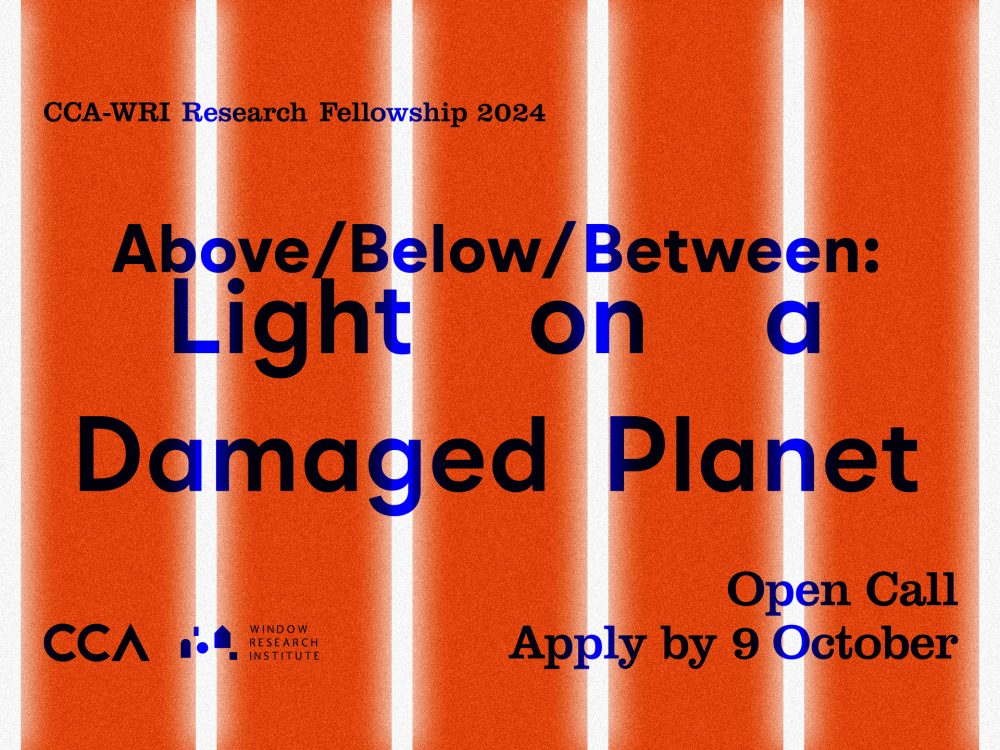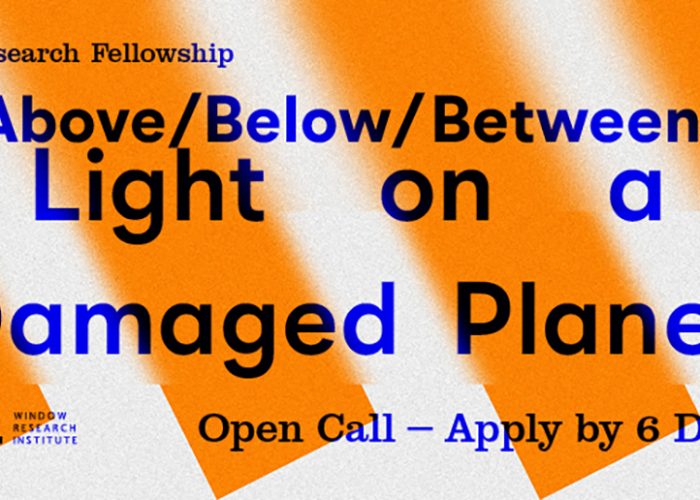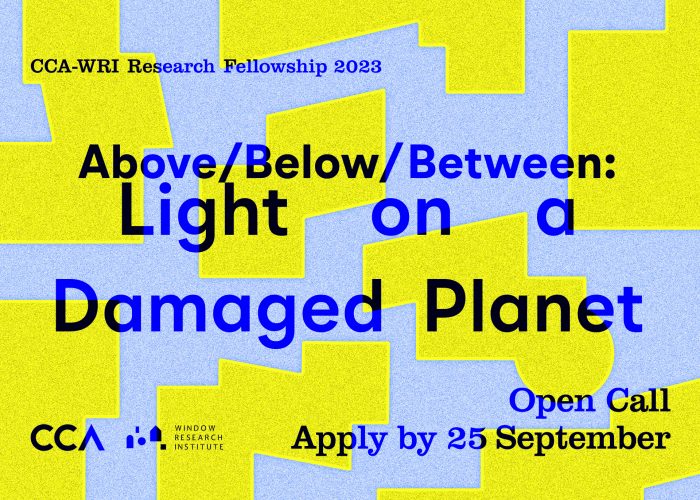This fellowship program, launched jointly with the Canadian Centre for Architecture (CCA), is open to accomplished professionals who hold a doctoral degree or have substantial work experience and a commitment to publishing, exhibiting, and/or professional practice.
The program offers a residency at the CCA for one to three months between June and October, during which fellows will address a research theme that explores the relationships between current societal issues and architecture based on the CCA collection. Each fellow will have a private office and receive monthly stipends and additional financial support for travel expenses.
We are now seeking three fellows for our 2024 program, “Above/Below/Between: Light on a Damaged Planet.” Applications are now available on the CCA application portal until September 25, 2023. We are pleased to inform you that the deadline is extended to October 9, 2023
CCA-WRI Research Fellowship
Above/Below/Between: Light on a Damaged Planet
The recognition of the manifold meanings and architectural mediations of light, which are becoming only more salient in our era of ecological crises, is common to both the CCA and the Window Research Institute. This emergent ecological reality is creating new practices, designs, and other social and material manifestations of architectural design that are above, below, and between; atmospheric, underground, and attentive to increasingly damaged landscapes all around us. Whether through increased average temperatures, more prevalent drought patterns, or sea level rise, light on this damaged planet is materially responsive to our human-impacted ecosystem. Apertures condense and make palpable this source of light and the need to question its root causes.
This affinity has led to our working with the WRI to jointly provide conditions for deep inquiries into the phenomenon of light. This collaboration represents a new model of fellowship for the CCA; whereas our institution observes an ever-expanding array of architectural subjects, the WRI holds a specific focus on light and windows, in their technological, cultural, and societal dimensions.
The third and final iteration of the CCA-WRI Research Fellowship Program Above/Below/Between: Light on a Damaged Planet continues to seek to understand architectureʼs varied relationships to the changing material constitution of the light spectrum. In 2024 we will welcome three CCA-WRI Fellows for periods of research of up to three months, with Fellowsʼ turning their attention to the third element in the diffusion of light across our solar societies: between, and the everyday conditions that permeate how light shapes and is shaped by the built environment.
The ʻbetweenʼ names a specific set of phenomena that become apparent between the atmosphere and land, ones that reflect the Earthʼs condition as a solar-dependent environment. These include, for example, the increasing levels of air pollution across the globe, and how this is becoming a major concern for everyday human activities in towns and cities. The between contains the chemical aftereffects of carbon combustion, industrial production, and forest fires. Air pollution thus becomes a phenomenon that generates a range of mitigation practices, from investments in public transit to green industrial technologies more broadly.
Similarly, the between is mediated by the role windows play as apertures through which social, ecological, and political thresholds are navigated across geographic and climatic conditions. The CCA-WRI Research Fellowship Program seeks expansive and theoretically ambitious approaches to the ʻbetweenʼ that can make out how it is a condition that moves through and connects the scale of the built environment through shared, inhabitable phenomena including air pollution indexes; political and social resistance to the growth of public transit investment; or hurricanes and other major weather events that reconfigure the boundaries between waterways and places of human inhabitation. This final iteration of the program will place particular emphasis on defining, exploring, and projecting how the ʻbetweenʼ can be a ʻsolar landscapeʼ determined by the sun as, equally, an energy resource, a source of existential heat threat, and an ecological threshold to the planetʼs climactic conditions.
In line with this, we also welcome more metaphorical and conceptual approaches to the ʻbetweenʼ that serve as a bridge between spatial and temporal conditions that interpolate questions of adaptive reuse, interstitial ecologies, and historiographical questions related to the periodization of environmental phenomena in relation to the temporal regimes of the built environment. Researchers could engage with a range of materials held by the CCA, including work related to early solar design, particularly that undertaken by architect Douglas Kelbaugh; the oeuvre of Italian architect and artist Gianni Pettena, with a focus on projects that have a recuperative relationship to the environment; and/or projects realized by landscape architect Cornelia Hahn Oberlander that forecast a future with higher levels of air and other forms of pollution.
While 2024 Fellows may focus on the between as an intertwined and mobile site of transit, contamination, flowing ecologies, and apertures as political thresholds, as in the previous two iterations of the fellowship program we welcome applications that address a range of topics, particularly those that take the theme of damaged light and solarity as a social condition more broadly in new directions:
– Air pollution, determinants of health, and the built/unbuilt environment
– Transit-oriented urbanisms (in relation to density, climate, real estate speculation, etc)
– Borderless ecologies
– Global-warming related weather events and their impacts on the built/unbuilt environment
– The politicization of windows and their materiality
– Solar design, particularly as a material
– Light as a form of social capital
– Solar landscapes, whether dry, arid, or desert
– Luminescence as a historical, geographical, and social process
The Program
CCA-WRI Fellows are offered a residency at the CCA between June and October 2024, for a period of one to three months. Each Fellow will have access to a private office and receive a monthly stipend of CAD 5,000, as well as additional financial support for travel expenses. In addition to a public presentation of their work-in-progress, Fellows are expected to participate in discussions, seminars, and workshops organized at the CCA, exchange with CCA staff, and engage with the local academic and architectural community.
The jury members for this edition of the CCA-WRI Research Fellowship Program are: Giovanna Borasi (CCA Director), Rafico Ruiz (CCA Associate Director, Research), Yoshiharu Tsukamoto (Co-Founder of Atelier Bow-Wow/Professor, Tokyo Institute of Technology/WRI Board of Directors Member), Daniel Barber (Head of School, School of Architecture, University of Technology Sydney), and Masatake Shinohara (Associate Professor, The Graduate School of Advanced Integrated Studies in Human Survivability, Kyoto University).
Application Requirements
Candidates for the 2024 CCA-WRI Research Fellowship Program are invited to submit an application that describes how their research project, and its expected outputs can significantly enrich how we think and speak about architecture. All applications must be submitted in English or French, and comprise the following:
– a proposal (750-1,000 words) addressing how the research project relates to the theme as well as to the CCA (which collection holdings will be consulted, if applicable). We strongly encourage applicants with research projects based on recent acquisitions to check and confirm availability with ref@cca.qc.ca before submitting their project proposals.
– an abstract of the proposal in English or French (250 words) or Japanese (400 letters)
– a brief project schedule (300 words) for a one- to three-month period of research, describing key milestones
– a CV
– one representative publication (article or book chapter) or equivalent
– the names of two potential referees. Letters of recommendation are not required at the time of application and will only be requested in the case of short-listed applicants
Scholars applying to the Program should hold at least a doctoral degree. All other applicants, particularly practitioners and cultural producers must demonstrate substantial work experience and a commitment to publishing, exhibiting, and/or professional practice.
All applications must be submitted online through the CCA application portal.
Deadline: 9 October 2023 at midnight (12am, HNE)
For more information on eligibility and the application process, please visit:
www.cca.qc.ca/en/81926/cca-wri-research-fellowship-program
For questions regarding the program, please contact:
studium@cca.qc.ca
About the Partnership
The CCA operates in the spaces between architectural culture at large and academic discourse through exhibitions, publications, public events, and research programs. As an international research institution, it is concerned not only with building new knowledge but also with making that knowledge productive. To do this, it applies architectural perspectives to topics beyond their usual disciplinary scope and methods from other fields to traditionally architectural subjects. It aims to adopt new ways of investigating that combine cultures and perspectives emerging from architectural practice, curatorial and publishing practice, and academic study.
For over a decade, the WRI has implemented research programs focused on windows and openings. Windows—which play multifaceted roles in lighting, ventilation, viewing, security, and energy conservation—serve as intersections for various technologies and constitute one of the most fundamental elements that characterize architecture. As the contact point between the outside and inside, windows relate closely to not only architecture but to surrounding climates and peopleʼs lifestyles. With our view of windows through a multifaceted lens—as a reflection of our society, culture, and technology—we seek to understand architecture in a fresh light to explore its role in society.
In this partnership, we aim to establish a cross-institutional fellowship program that tackles urgent public issues by combining the CCAʼs comprehensive insight, collection, and research system with the WRIʼs unique expertise.
Canadian Centre for Architecture
The Canadian Centre for Architecture (CCA) is an international research institution and museum premised on the belief that architecture is a public concern. We produce exhibitions and publications, develop and share our collection as a resource, advance research, offer public programs, and host a range of other activities driven by a curiosity about how architecture shapes—and might reshape—contemporary life. We invite collaborators and the wider public to engage with our activities, giving new relevance to architectural thinking in light of current disciplinary and cultural issues.
cca.qc.ca
Window Research Institute
The Window Research Institute (WRI) advances and implements research and cultural programs focused on windows. For over a decade, we have explored the role of architecture in society through our uniquely cultivated perspective. We conduct research, provide grants, and present our findings through publications, exhibitions, and lectures. Reaching beyond architecture, the Institute collaborates with a range of prominent institutions and individuals at home and abroad to develop multifaceted discussions.
madoken.jp
Media Contacts
Julia Albani
Canadian Centre for Architecture
studium@cca.qc.ca
CCA-WRI Research Fellowship 2023
Window Research Institute


